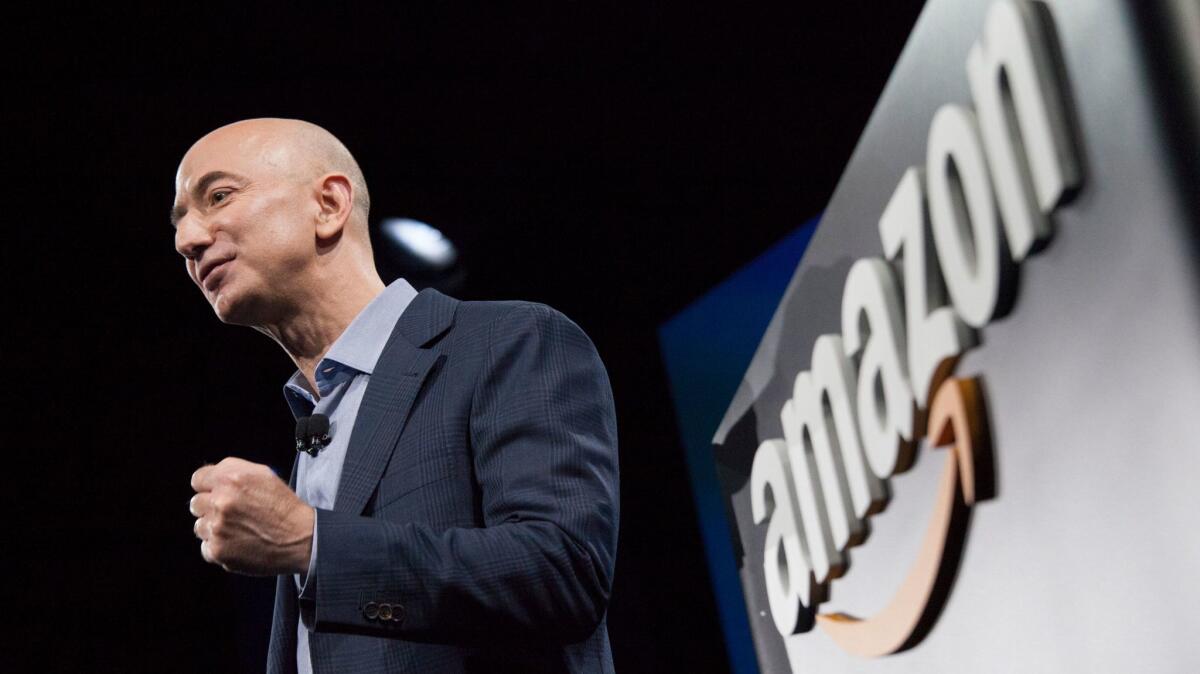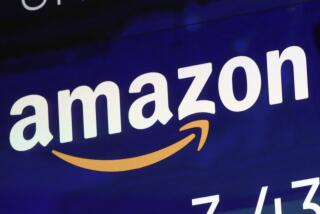Silicon Valley’s acquisition targets aren’t just in tech anymore

For once, the target of an extravagant tech industry acquisition wasn’t a small start-up unfamiliar outside of Silicon Valley, but a household name.
Few foresaw Amazon.com reaching an agreement Friday to buy grocery store Whole Foods for $13.7 billion. But the pending deal — a record purchase for Amazon — has opened the possibility of the nation’s biggest tech companies acquiring businesses known for bricks-and-mortar stores rather than software.
As struggling retailers, banks and automakers weigh buying technology to catch up to the smartphone age, the likes of Amazon, Google and Facebook may find it simpler to rescue the hobbled.
“Amazon is effectively saying that if retailers are going to tool themselves up with technology, then it will tool itself up with a physical presence and high-street brand,” said Paul Cuatrecasas, chief executive of the British investment bank Aquaa Partners. “It helps justify the belief that the larger tech giants will start buying up established companies, like banks and automotive manufacturers. The impact could be immense and generational.”
Seeking ownership of decades-old, well-trafficked businesses would represent a significant role reversal for companies used to pouring billions of dollars into acquiring cutting-edge technology that’s unproven in the market.
Forecasting big shifts in how people will educate, entertain and even dress themselves, Facebook has snatched up start-ups such as WhatsApp, Oculus and Instagram. Microsoft and Alphabet picked up online software firms such as Mojang and Waze. Amazon and Apple scooped up robot builders. Those deals, despite their billion-dollar price tags, mark predictable purchases from the Silicon Valley playbook.
It’s a land grab for technology: You either get your paws on it or someone else does.
— Hrach Simonian, a general partner at Canaan Partners
But this group of tech industry giants has more than $500 billion in cash to burn, historic amounts fueled by billions of Google searches, iPhone sales and online purchases. Their shares are hitting record highs, outpacing growth in the broader stock market. And persistently low interest rates also have reduced the costs of borrowing cash to fund deals.
Conglomerates with interests in varied sectors aren’t favored by U.S. investors. Their demands for focus has spurred companies such as General Electric and Hewlett-Packard to spin off divisions in recent years. But investors have given more leeway to top tech chiefs, including Amazon’s Jeff Bezos and Microsoft’s Satya Nadella, than to most of corporate America.
The support reflects transformations they’ve led in recent years. Microsoft recovered from stumbles in designing smartphones to become a leader in online storage technology. Apple is investing in content and services to diversify beyond the iPhone, which accounts for about two-thirds of its sales. Amazon generated little profit most of its history, but significant inroads in online ad and computing services have nearly tripled its warchest to about $22 billion over the last four years.
The circumstances add up to a recipe for bigger and wilder investments than the companies may have once considered.
“Big tech has been king,” said Daniel Ives, a former stock analyst who oversees corporate development for Synchronoss Technologies. “Their success has been cemented to a point where they can go on the offensive.”
Netflix could target a fancy theater chain, adding free showings as a perk for subscribers while giving a lift to a business struggling to maintain attendance. Alphabet could match Amazon by making room for grocery chain Kroger or delivery company FedEx. Tech observers have dreamed of Apple purchasing HBO or Tesla Motors.
“It demonstrates the capability that the largest tech companies now have,” Cuatrecasas said. “Market value is power. Cash is power. Talent is power. They have all that, more so than any other companies. And they have a global presence.”
The leading tech companies of the 1980s and ’90s had narrow visions. When the World Wide Web emerged, companies such as Sun and Cisco were the equipment providers. They had no reason to branch far afield from their core expertise because hardware and software development was challenge enough.
The generation built upon the Internet, which encompasses Amazon, Google, Facebook and Uber Technologies, didn’t manufacture technology or hold many hard assets.
Uber is basically a new-era taxi company. Facebook in essence is a media company, selling advertising and customer data on the backs of a massive staff of volunteer content creators. Amazon makes clever use of information to run a radically new kind of sales, pricing, distribution and logistics network that competitors are hard-pressed to replicate.
Considering their success, the tech firms are bullish about bringing software expertise to new sectors, whether it’s trucking in Uber’s case or groceries in Amazon’s.
The Whole Foods deal — unlike any other the leading tech companies have consummated before — may still prove an outlier.
Start-up investors and acquisition consultants say most of the deal-making in the coming years will look more like Friday’s other significant move: Wal-Mart’s $310-million purchase of men’s apparel start-up shop Bonobos. It could give the nation’s biggest retailer software crucial to keeping pace with Amazon pricing and recommendation software.
“The tech disruption is happening,” said Hrach Simonian, a general partner at Canaan Partners who led the firm’s investment in grocery delivery start-up Instacart. “It’s a land grab for technology: You either get your paws on it or someone else does.”
Tech companies — coming from a position of strength — can be more selective.
It’s unlikely any would tarnish their brands by acquiring a company that doesn’t have a high-end appeal, said Aaron Solganick, chief executive of Los Angeles tech investment bank Solganick & Co.
For instance, Solganick doesn’t expect Apple to buy Ford anytime soon despite the iPhone maker’s growing interest in making self-driving cars and the fact that it has five times as much cash as likely needed to acquire the slumping auto giant.
On the flip side, automakers are identifying tech investments of their own. It’s an open question, for example, whether they will stick with manufacturing in the long run versus farming it out. That’s what Jaguar is already doing with its I-Pace luxury electric SUV, due in 2018. The car will be built by a manufacturing contractor, similar to Foxconn building iPhones for Apple.
In the end, the necessity of traditional industrial firms to adapt means fewer tech-buys-old-school announcements than vice versa, Solganick said.
Getting into retail, finance or autos poses a risk of backfiring. Tech firms are attracting increasing scrutiny from government regulators over collecting data about consumers. Having more entry points for consumers would seem to add to data troves.
Customers of the acquired business may be turned off by what they consider overreach. But Silicon Valley giants so far have demonstrated the ability to leave independent their acquired companies — at least as tech start-ups go.
“Amazon will have the attitude of ‘how can we help?’” Cuatrecasas said. “’What can we do to help you give a better experience to a Whole Foods customer?’ For it to go wrong, you would have to assume they would take over operations and I don’t see that happening.”
Times staff writer Russ Mitchell contributed to this report.
Twitter: @peard33
ALSO
Amazon-Whole Foods deal hammers grocery stocks; Dow ticks up to new high
Amazon shakes up the grocery business with its $13.7-billion deal to buy Whole Foods







